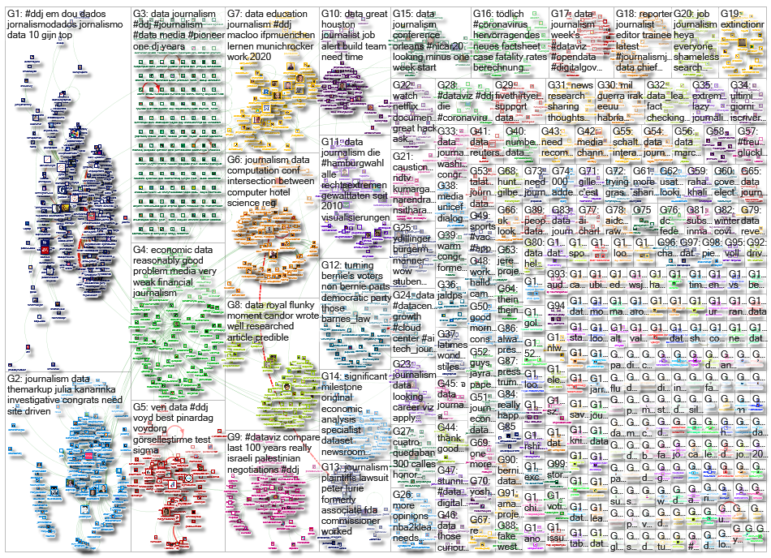What’s the global data journalism community tweeting about this week? Our NodeXL #ddj mapping from February 24 to March 1 finds The New York Times digging into some curious data from two Instagram accounts of the British royal family, Al Jazeera analyzing Trump’s plan for the Israeli-Palestinian conflict, The Markup launching with an investigation into auto insurance algorithms, and Pew Research Center sharing US election data snapshots.
The Royal Instagram Mystery
Here’s a tale of two Instagram accounts of members of the British royal family — @KensingtonRoyal for Prince William and wife Catherine, and @SussexRoyal for Prince Harry and wife Meghan — and the controversy surrounding the growth of both accounts. The New York Times weaved a story in the vein of Romeo and Juliet’s warring Capulet and Montague families after digging into some curious statistics. The numbers show that @KensingtonRoyal consistently outpaced @SussexRoyal even on days when no content was posted.
I'm Carrie in Homeland but for Meghan Markle and Kate Middleton's Instagram accounts https://t.co/ehzo5ukjQX pic.twitter.com/OTDL9hSLov
— Caity Weaver (@caityweaver) February 27, 2020
Failed Israeli-Palestinian Deals over a Century
In January this year, US President Donald Trump revealed his Middle East peace plan to resolve the seven-decade-long Israeli-Palestinian conflict. Al Jazeera read all 181 pages of the plan and compared it to previous failed deals and declarations.
THREAD 👇
How does Trump's so-called 'deal of the century' compare with the last 100 years of Israeli-Palestinian negotiations?
We read all 181 pages of Trump’s plan and compared its language with 100 years of failed agreements https://t.co/dutQ5fCdkN pic.twitter.com/RzKGFFXpDN
— Al Jazeera English (@AJEnglish) February 28, 2020
Launch of The Markup
After a long and bumpy road, The Markup has finally launched. The nonprofit newsroom, which investigates how powerful institutions use technology to change our society, earlier saw its editor-in-chief Julia Angwin fired just months before its initial 2019 launch. That prompted its editorial team to resign in protest. Angwin has since been rehired. Read her letter here and The Markup’s first investigation here.
The Markup, which will investigate big tech, has launched and it looks great! Bravo @lisatozzi + @nabihasyed https://t.co/jWZYo1nSh0
— Jane Bradley (@jane__bradley) February 25, 2020
US Election: Data Snapshots
Forty-eight percent of American adults surveyed by the Pew Research Center said they were very concerned about the influence of made-up news during the presidential election. This is just one snapshot of the survey data Pew has on the 2020 presidential election. See more here.
Really interesting findings from @pewresearch https://t.co/zkjkVVo8iY pic.twitter.com/LNcPNsqcjO
— Jim Malewitz (@Jmalewitz) February 26, 2020
Adjusting Data Journalism Curricula
In a research paper, Norman P. Lewis, Mindy McAdams, and Florian Stalph offer four recommendations to help educators adjust curricula to accommodate the rapid integration of data into journalism.
How to adjust journalism education to accommodate data reporting? @bikeprof @macloo and @fstalph point to 4 important curriculum components: statistics training, data and #dataviz communication skills, data ethics, and computational thinking training. #ddj https://t.co/zD4eVIaYxg
— Felix Irmer (@fexi) February 26, 2020
Interview: The WashPost’s Aaron Williams
Aaron Williams, data reporter for the investigative team at The Washington Post, talks to the Malofiej website about his process in creating graphics, and the work he is most proud of.
My favorite part of this great @aboutaaron interview with @malofiej is how he admits to using @rstudio among his tools for data analysis https://t.co/wTMeWdP9ds pic.twitter.com/m14tRNJscW
— Andrew Ba Tran (@abtran) February 27, 2020
Mapping the Sigma Awards Shortlist
The Sigma Awards saw a record number of submissions, with 510 projects from 66 countries and areas. Batjo Data co-founder Alice Corona mapped where the shortlisted and winning projects came from.
Curious about geo-diversity at @sigmaawards , I made a map of shortlisted and winning projects https://t.co/wYmANOcmpT #ddj pic.twitter.com/L3bXnsAO8D
— Alice Corona (@alice_corona) February 25, 2020
Brazilian Databases
Looking for data stories in Brazil? CNN Brasil journalist Luiz Fernando Toledo lists seven databases in this Twitter thread for journalists to explore, including federal budget data, the national registry of mines, and the refugee applications register.
Tá fazendo frilas e precisa achar pautas inéditas? Aqui estão 7 bases de dados pra vc explorar (e nao precisa ser um jornalista de dados para saber usar):
— Luiz Fernando Toledo (@toledoluizf) February 22, 2020
Automating Data Gathering and Analysis
Applied XLabs is a new startup building tools that can automate data-gathering for journalists — and, eventually, for knowledge workers in other industries. It plans to develop products to help newsrooms, starting with The Boston Globe.
“The plan is for Applied XLabs to develop products to help newsrooms, starting with The Globe, automatically pull data and generate insights.” #DataJournalism #AI #EMPJ https://t.co/dcv6xrbq3v
— Christina Vazquez (@CBoomerVazquez) February 29, 2020
Computation + Journalism Research Abstracts
The Computation + Journalism Symposium will be held at Northeastern University on March 20 and 21. The program committee pre-released the accepted papers and abstracts. It covers topics from algorithmic journalism to deepfake detection.
i'm so excited for computation+journalism!! i will demo new work with Dhiraj Barnwal, @RupayanN, @arvindsatya1 on the Lyra visualization design software.
we want to help journalists quickly create interactive visualizations without writing code.https://t.co/VzSwDEnUVu pic.twitter.com/9gBRicBr43
— jonathan zong 🍊🥄 (@ohnobackspace) February 28, 2020
Thanks again to Marc Smith of Connected Action for gathering the links and graphing them. The Top Ten #ddj list is curated weekly.
 Eunice Au is GIJN’s program coordinator. Previously, she was a Malaysia correspondent for Singapore’s The Straits Times, and a journalist at the New Straits Times. She has also written for The Sun, Malaysian Today, and Madam Chair.
Eunice Au is GIJN’s program coordinator. Previously, she was a Malaysia correspondent for Singapore’s The Straits Times, and a journalist at the New Straits Times. She has also written for The Sun, Malaysian Today, and Madam Chair.

